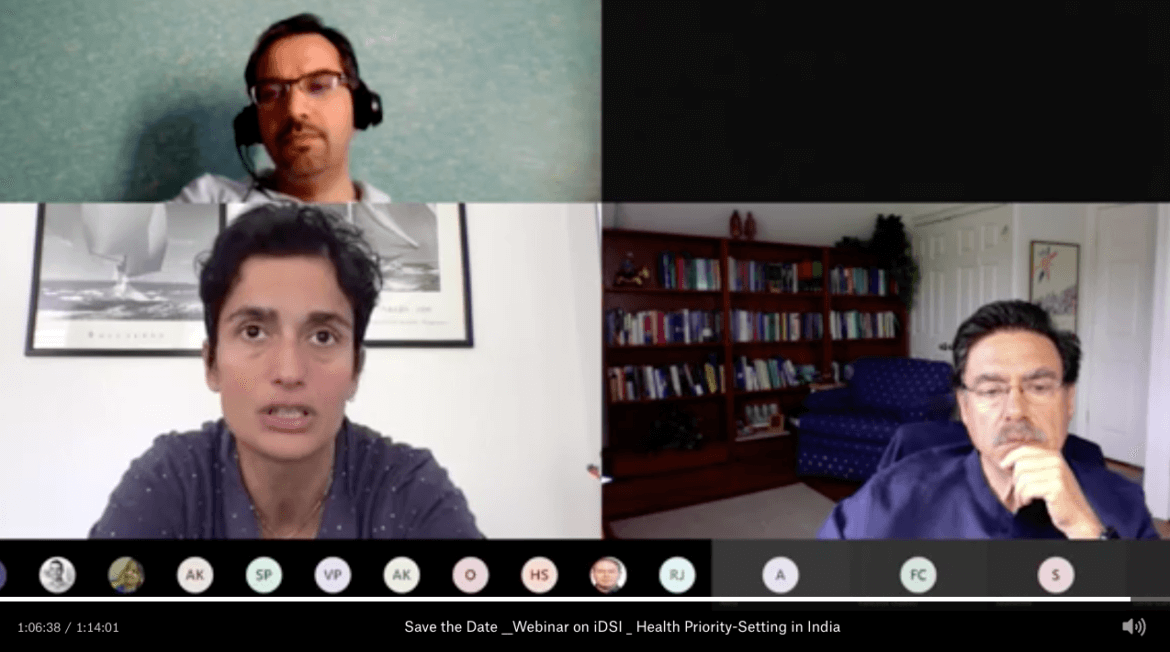iDSI hosts webinar for health system design partners of the Bill & Melinda Gates Foundation in India.
By Abha Mehndiratta, Kalipso Chalkidou, Saudamini Dabak, 5th May 2020
Health Technology Assessment (HTA) is a policy tool to support rational priority-setting. In India, it allows decision-makers to make informed comparisons to ensure cost-effective, high-quality health services and interventions are supplied or purchased by the Ministry and State Departments of Health and Family Welfare. As India moves towards the achievement of Universal Health Coverage (UHC) with the Ayushman Bharat Scheme, HTA is critical for choosing services/interventions which provide value for money. This is applicable for both the health benefits package of the Pradhan Mantri Jan Aarogya Yojana (PMJAY) health insurance scheme and primary care services provided by the Health and Wellness Centres. It can also help improve quality control of the growing private healthcare sector in India by improving return-on-investment of public-private partnerships with better quality and appropriate care.
The International Decision Support Initiative (iDSI) was invited by the Bill & Melinda Gates Foundation (BMGF) India Country Office to share its experience of supporting institutionalisation of HTA in India with other BMGF partners. During the webinar iDSI partners from the Center for Global Development (CGD), Health Intervention and Technology Assessment Program (HITAP) – Thai Ministry of Public Health, Imperial College London and the Post-Graduate Institute of Medical Education and Research (PGIMER), Chandigarh shared their work within India on the healthcare priority setting agenda. Links to the recorded video and slides from the webinar are available and a brief overview of the session is provided below:
iDSI is a global network of priority setting institutions that has been collaborating with partners in low-and-middle income countries (LMICs) to build capacity for HTA. Since 2013, iDSI has partnered with countries such as Indonesia and China on institutional strengthening, data and analytics, development of global public goods on methods and tools, and smart purchasing.
The Individual, Node, Network and Enabling Environment (INNE) framework was used as a systematic approach to share iDSI’s capacity building activities with stakeholders at various levels for institutionalisation of HTA in India to accelerate sustainable UHC.
- Individual: Increased technical capacity of users and producers of HTA via training workshops, higher education programs and technical support on HTA studies.
- Node: Strengthened institutional frameworks by supporting the Department of Health Research (DHR) in establishing HTAIn (Health Technology Assessment in India) infrastructure. For example, by sharing relevant documents on HTA process and methods, country experiences etc.
- Network: Facilitated and encouraged participation of partners from India who routinely undertake HTA studies at relevant HTA network meetings like HTAsiaLink Conference, the Prince Mahidol Award Conference (PMAC) etc.
- Enabling Environment: Catalyzed increased political commitment and buy-in for evidence informed priority setting through high-level engagements and awareness raising events.
Examples of applications of HTA in India were shared such as (i) HTA on anti-viral drugs for Hepatitis C that led to its inclusion in Punjab Government’s health benefits package and also caused change in standard treatment guideline for Hepatitis C management (ii) HTA on safety-engineered syringes leveraged by the Government for price negotiation and procurement. The government of Andhra Pradesh to decide on this topic subsequently cited this study.
HTA related knowledge products from India were briefly discussed during the webinar. This included the HTA methods manual; budget impact modelling guidelines; health related quality of life value set (EQ5D5L) for India, Cost of Health Services in India (CHSI) study and the National Cost Database for India. The National Cost Database is a central resource for users and producers of cost data and currently includes data from 200 public facilities in 6 states. Analytic work using the National Cost Database is being continued to develop a unit cost predictor to estimate unit costs of healthcare service delivery in India.
IDSI’s work with partners has laid the groundwork for the future by increasing capacity of users and producers of HTA. It has supported in country efforts in building an infrastructure for evidence-informed policymaking, developing a range of knowledge products and strengthening networks with partners in other countries. In addition, based on current trends, the importance of prioritising healthcare resources will become all the more acute as India emerges from the COVID-19 crisis. In the post-COVID-19 era it is unlikely to be business as usual. India will need to balance pre-COVID-19 UHC commitments with clearing up backlog of elective procedures and resuming vaccination and screening campaigns during what is forecast to be the deepest recession since 1979. Demonstrating value for money through systematic processes will therefore be a policy priority and ought to be seen itself as a Best Buy for healthcare systems.
